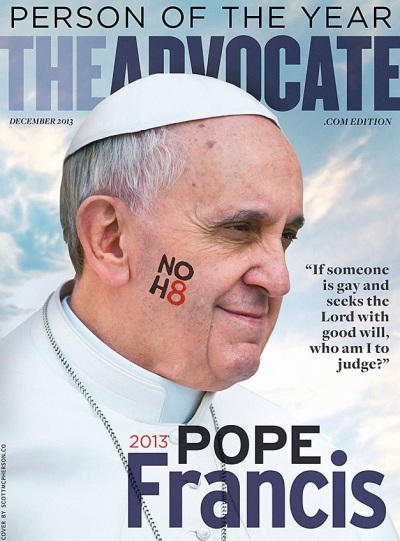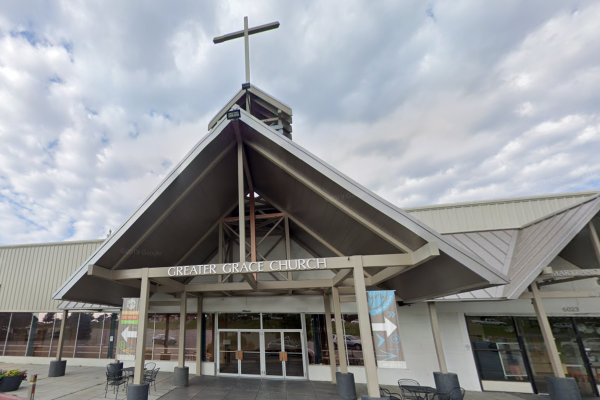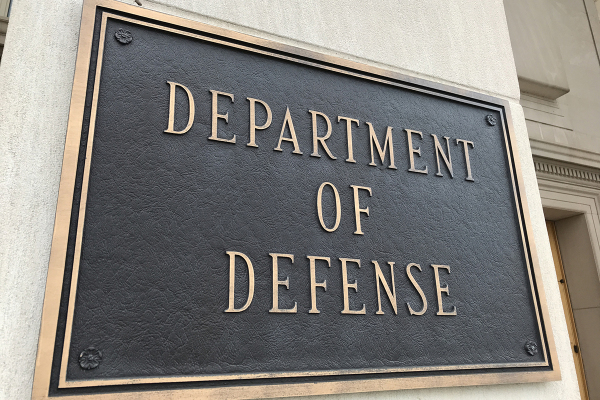LGBT Magazine Selects Pope Francis as Its Person of the Year

America's oldest LGBT magazine has selected Pope Francis as its person of the year.
The Advocate claimed that rooted in its decision to pick the popular Christian figure was the belief that the Pope -- better than litigation and gay marriage cases -- could change the sentiments of the "remaining holdouts for LGBT acceptance in religion."
"The pope's impact isn't on whether we're deciding to sit in the pews, it's on the people who are already in the pews," Lucas Grindley wrote. "More so, it's on the devoted who are there every Sunday plus the middle of the week and who volunteer for charity work and who are sometimes our most ardent opposition."
The publication pointed out that many in the highest echelons of America's political power are not LGBT, they are Catholic, a population over which the Pope has influence.
"Will the nine straight people seated on the Supreme Court -- six of whom who are Roman Catholic -- ever cast a far-reaching ruling that makes marriage equality legal in all 50 states? Will the House of Representatives -- of which nearly a third of members are Catholic, more than any other religion -- pass the Employment Non-Discrimination Act? Will any of them consider the pope's advice against casting judgment?" it asked.
The Advocate was also moved by how it felt that Pope Francis had personally reached out to the LGBT community, a characteristic for which he has become known his brief tenure as head of the Catholic Church. It noted that "Italian Catholic LGBT group" Kairos had written the Pope asking for "openness and dialogue" and shared their sentiments that the Church "feeds homophobia."
"LGBT Catholics had written to previous popes, but Francis is the first to write a reply," wrote Grindley. "Both sides have largely kept the content of their conversation private, except to note with a level of amazement that the pope gave the LGBT group his blessing."
Since assuming the papacy, Pope Francis' statements regarding homosexuality and the Church have garnered significant media attention, although he has not made any changes to church doctrine about marriage or sexual orientation.
In July, he and the former Pope Benedict issued a joint encyclical where they reiterated existing Church doctrine, defining marriage as a "stable union of man and woman," that is "born of their love, as a sign and presence of God's own love, and of the acknowledgement and acceptance of the goodness of sexual differentiation."
That same month, the Pope made one of his most frequently cited remarks about the how LGBT members fit into the Catholic church when he told reporters, "If someone is gay and seeks the Lord with good will, who am I to judge?"
While those hoping that the Pope would liberalize Church doctrine are disappointed -- many disgruntled and angry commenters vented their frustration that the LGBT magazine chose the "not pro-gay by today's standard" figurehead -- for The Advocate's editorial board, they felt a tone shift was significant enough.
"The brevity of that statement and the outsized attention it got immediately are evidence of the pope's sway. His posing a simple question with very Christian roots, when uttered in this context by this man, "Who am I to judge?" became a signal to Catholics and the world that the new pope is not like the old pope," wrote Grindley.
Last week, TIME magazine made the Pope their Person of the Year, crediting his ability to meaningful speak to "the central conversations of our time: about wealth and poverty, fairness and justice, transparency, modernity, globalization, the role of women, the nature of marriage, the temptations of power."
"And yet in less than a year, he has done something remarkable: he has not changed the words, but he's changed the music. Tone and temperament matter in a church built on the substance of symbols—bread and wine, body and blood—so it is a mistake to dismiss any Pope's symbolic choices as gestures empty of the force of law," Nancy Gibbs wrote.






















